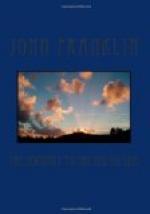I had scarcely secured myself by a lodge of branches from the snow and placed the moose in a position for my sketch when we were stormed by a troop of women and children with their sledges and dogs. We obtained another short respite from the Indians but our blows could not drive, nor their caresses entice, the hungry dogs from the tempting feast before them.
I had not finished my sketch before the impatient crowd tore the moose to pieces and loaded their sledges with meat. On our way to the tent a black wolf rushed out upon an Indian who happened to pass near its den. It was shot and the Indians carried away three black whelps to improve the breed of their dogs. I purchased one of them, intending to send it to England, but it perished for want of proper nourishment.
The latitude of these tents was 53 degrees 12 minutes 46 seconds North, and longitude by chronometers 103 degrees 13 minutes 10 seconds West. On the 5th of April we set out for the hunting tent by our former track and arrived there in the evening.
As the increasing warmth of the weather had threatened to interrupt communication by removing the ice orders had been sent from Cumberland House to the people at the tent to quit it without delay, which we did on the 7th. Some altitudes of the Aurora Borealis were obtained.
We had a fine view at sunrise of the Basquiau Hill, skirting half the horizon with its white sides chequered by forests of pine. It is seen from Pine Island Lake at the distance of fifty miles and cannot therefore be less than three-fourths of a mile in perpendicular height; probably the greatest elevation between the Atlantic Ocean and the Rocky Mountains.
A small stream runs near the hunting tent, strongly impregnated with salt. There are several salt springs about it which are not frozen during the winter.
The surface of the snow, thawing in the sun and freezing at night, had become a strong crust which sometimes gave way in a circle round our feet, immersing us in the soft snow beneath. The people were afflicted with snow blindness, a kind of ophthalmia occasioned by the reflection of the sun’s rays in the spring.
The miseries endured during the first journey of this nature are so great that nothing could induce the sufferer to undertake a second while under the influence of present pain. He feels his frame crushed by unaccountable pressure, he drags a galling and stubborn weight at his feet, and his track is marked with blood. The dazzling scene around him affords no rest to his eye, no object to divert his attention from his own agonising sensations. When he arises from sleep half his body seems dead till quickened into feeling by the irritation of his sores. But fortunately for him no evil makes an impression so evanescent as pain. It cannot be wholly banished nor recalled by the force of reality by any act of the mind, either to affect our determinations or to sympathise with another. The traveller soon forgets his sufferings and at every future journey their recurrence is attended with diminished acuteness.




